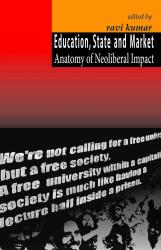Ravi Kumar‘s new book Education, State and Market: Anatomy of Neoliberal Impact published by Aakar Books (Delhi) is the first volume to comprehensively examine the impact of neoliberal capitalism on education in India.
Kumar is a professor in the Department of Sociology at the University of South Asia, in Delhi. He blogs here and is also part of the editorial collective at Radical Notes.
Praise for the volume:
The book presents a set of papers that illuminate in profound ways how the wide-angle historical frames provided by Marxist analysis facilitate our understanding of the details embedded in national and more local educational contexts. Neoliberalism attacks human dignity. The consequences of social, economic, and educational policies that exacerbate inequality, magnify exploitation, and undermine personal and social freedoms are clearly analyzed by each of the contributors. The circumstances are dire and readers will most certainly be outraged as they learn how neoliberal policies and practices reduce the process of education to a commodity and teachers and learners to elements in formula for the relentless production of profit. This volume presents a clear and compelling analysis of how neoliberal thought and practice has transformed education at the policy level in India and in the process distorted the official aims of education as well as social relations among teachers and learners. Most importantly, however, these chapters provide insights into how we might channel our rage against neoliberal capitalist mechanisms into the creation of new visions of resistance to educational practices that privilege profits over people.
– E. Wayne Ross, University of British Columbia, Canada
Editor Ravi Kumar has assembled the finest scholarship to investigate key questions in regard to the relationship of the development of modern capitalism, its connections to empire, the role of the state, and the resulting impact on education. The essays within go to the core: what is valued as “knowledge” now? Who shall schools serve? Indeed: Why have school? The critical reader will find new questions, and profound answers.
– Rich Gibson, Professor Emeritus, San Diego State University, USA
